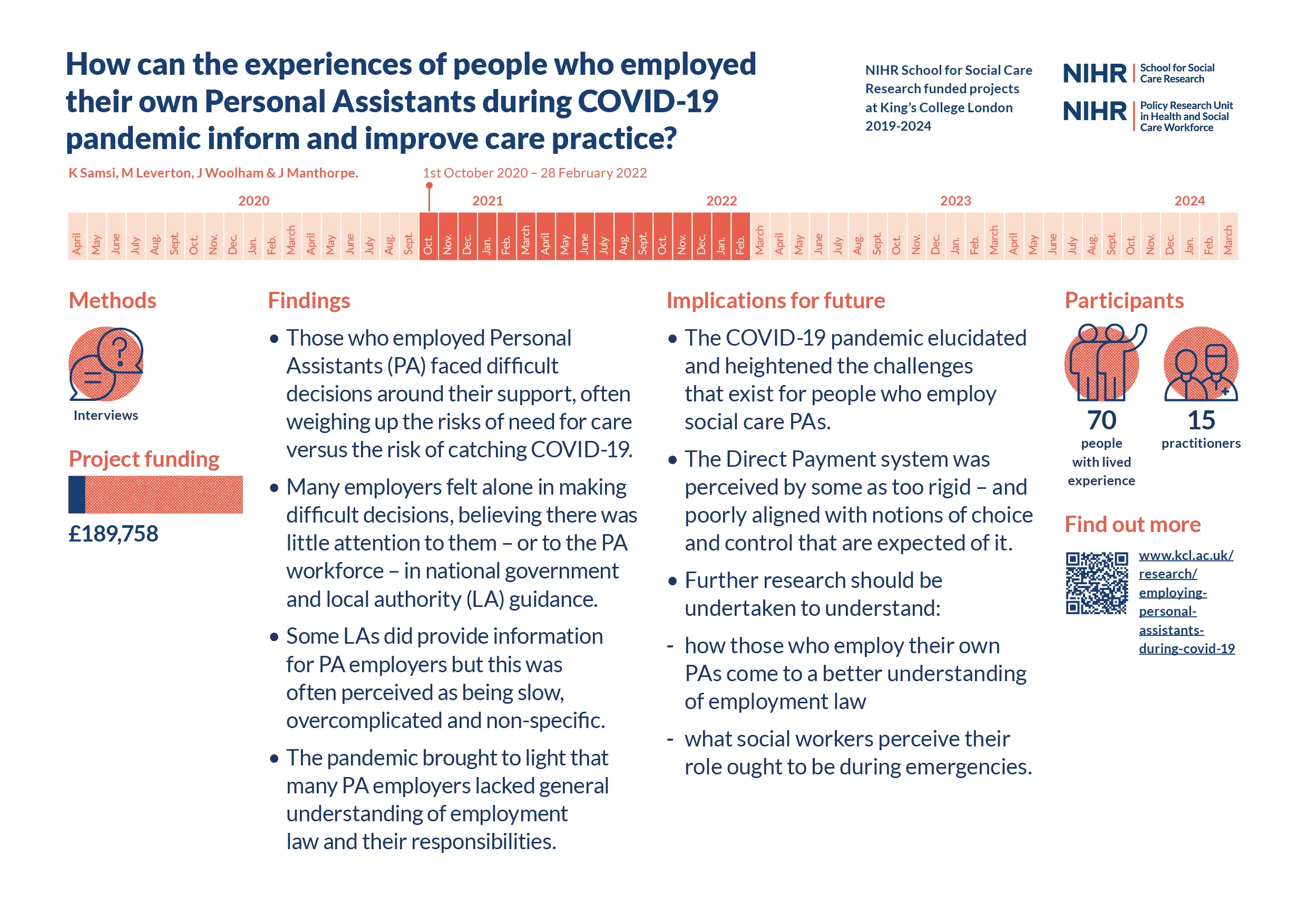Employing Personal Assistants during the COVID-19 pandemic: Lessons for social care practice

Download the above infographic (PNG) | Download the infographic for all the Unit's NIHR SSCR-funded work 2019-24 (PDF)
What happened to people employing their own care workers or Personal Assistants (PAs) during the Coronavirus pandemic? How did they manage? Did they stop this support; adjust to new ways of care and support; and have they restarted their PA or done something different? Did their local council contact them with advice, or was other information available? This study, focusing on the experiences of people employing their own care workers, is helping answer these questions. They are important for social care practice now and in the future in case of new outbreaks of the virus or for another similar emergency.
This study is asking people who employ PAs about their experiences during the time of lockdown and beyond. We are talking with both people who pay for a PA by Direct Payments from the council and people who pay their PA independently. We are interviewing 70 individual employers (care users) and family members (if they are the employer because their relative cannot manage these arrangements), to learn from their experiences. We are also interviewing people from 5-6 brokerage or support agencies that help people find possible PAs, or support PA employers.
Project duration
1 November 2020 – 31 March 2022
Project funder
NIHR School for Social Care Research
Ethical approval for the project
NHS Health Research Authority, Social Care Research Ethics Committee Ref: 21/IEC08/0010
Methods
We are interviewing people from different backgrounds and circumstances. For example, some may have ‘shielded’ themselves or have particular risk factors (we now know these include ethnicity). We are recruiting people from different parts of England and who need different types of support, for example some people need help with eating; other people want their PA to help with getting out and about.
The interviews are being done by phone or by video. We are examining and comparing people’s experiences so that we can learn from them and use them to develop guidance for local councils, voluntary sector organisations, social care workers and for other people in this situation. We are talking about the main pandemic period and beyond (if the virus declines) and plan to produce reports that are useful. We will make this information easy to get hold of by producing short reports and webinars. We will also publish our findings in journals, at conferences and through our websites and social media. We will do a short YouTube presentation for PA employers and families. We will work with organisations providing advice and guidance to make sure our research reaches the right people.
Study Advisory Group
Our Study Advisory Group draws on its members’ insights and experiences, helping our findings to have influence. This Group is funded to help us and involves people who employ their own care workers. They help us design interview guides, understand what people tell us, and make sure our findings are easy to understand.
Personal Assistant studies at HSCWRU
- [PA-1] described their background and skills, the work they do, the nature of their relationship with their employers and their employment conditions. (NIHR Policy Research Programme)
- [PA-2] re-interviewed a proportion of the PAs who took part in the first study and collected information about the impact of the COVID-19 pandemic on their working lives. (NIHR Policy Research Programme)
- [PA-3] What enduring impacts has the COVID-19 pandemic had for PAs and the nature of their working relationships with their employer, their employer’s family (where relevant) and other community-based professionals? (NIHR Policy Research Programme)
- Employing Personal Assistants during the COVID-19 pandemic: lessons for social care practice (NIHR School for Social Care Research)
- Exploring working relationships between primary care and directly employed home care workers (Dunhill Medical Trust)
Note on research team
John Woolham was a research team member until his retirement at the end of 2021.
Our Partners

NIHR School for Social Care Research


